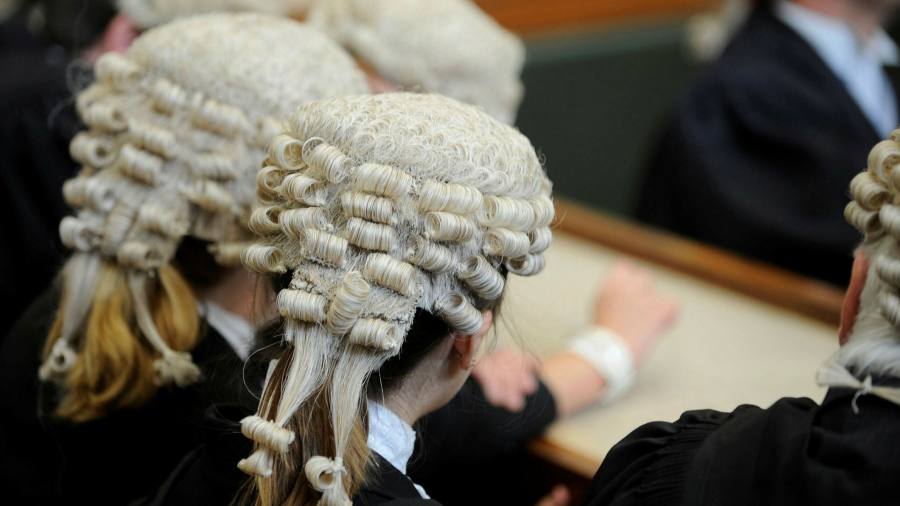[ad_1]
Alejandra Tascon, a criminal defence barrister, saw her workload grind to a halt after jury trials in England and Wales were suspended last March because of the coronavirus pandemic.
Almost a year later, her practice has not recovered. While she would normally do jury trials twice a month, she has done just two since June. A case she had been due to start in early January was abandoned because a participant was diagnosed with coronavirus.
Ms Tascon, 27, who came to London aged nine from Columbia, has managed to carry on working. But she said she knew of colleagues who had left the criminal bar. Senior lawyers warn that a profession which was under significant strain before the pandemic is now facing even greater pressure.
“It’s been a tough year and not just for me,†Ms Tascon said. “I have spoken to other barristers who have left the bar to move to work at solicitors’ firms or in local authorities . . . I volunteer with aspiring barristers and I hear that they don’t want to come into criminal work because they fear the financial difficulties that they will face.â€
Criminal barristers are mostly self-employed, except for those who work in-house at the Crown Prosecution Service, and are paid for representing defendants in trials through the government-funded legal aid scheme.
The Bar Council, which represents more than 16,500 barristers in England and Wales, acknowledged that many members of the profession had “suffered a substantial drop in earnings†since the start of the pandemic, with 72 per cent experiencing a significant reduction in new fee income.

It has forecast a double-digit fall in income this year for many barristers, particularly those doing criminal work, and in a study published last month found that 18 per cent of those surveyed actively wanted to leave the profession. The numbers of trainees — known as pupil barristers — fell by 35 per cent in 2020 to 386 compared to 592 pupils in 2019, according to new figures from the Bar Standards Board, which regulates barristers.
Derek Sweeting QC, chair of the council, told MPs on the House of Commons justice select committee last month that the criminal bar was being “hollowed outâ€, with mid-career barristers leaving after 10 years or so because it had become “a low-paid job for many people nowâ€.
Even before the pandemic, criminal barristers had been struggling. Government austerity measures imposed on the Ministry of Justice meant its total budget for 2019-20 was 25 per cent lower than in 2010-11. Declining fee rates for legal aid have sparked strike action by barristers twice in the past six years. In their first two years of practice, publicly funded barristers typically earn less than £13,000 pre-tax profit after paying essential expenses, according to the Bar Council.
Coronavirus has exacerbated the situation. The backlog of crown court cases rose from 39,765 on March 8 2020 to 54,115 by December 27, partly because of the temporary suspension of jury trials between March and May. The ongoing need for social distancing in crown courts has meant that fewer courtrooms can be used, even though the government has opened 19 new “Nightingale courts†housed in buildings like town halls to help ease pressure on the system.
The backlog is now attracting widespread worry. In a report published last month the government’s four chief justice inspectors, who monitor the probation service, police, prison and the Crown Prosecution Service, all expressed “grave concerns†about crown court backlogs on the wider justice system.
The Labour party called on the government last week to cut jury sizes temporarily from 12 to seven to allow more trials to start.
Many newly qualified barristers also said they had been unable to access the government’s income support scheme for the self-employed.Â

Cardiff-based barrister Martha Smith-Higgins, 24, said she was unable to access the scheme because she only began practising as a self-employed barrister in March 2019 and so had just three weeks’ income to show on her tax return for the year ending in April 2019. Instead she had to rely on help from her chambers, which waived her rent for a time and from the Barristers’ Benevolent Fund, a charity.
“It’s been incredibly difficult but I feel I have been well supported by my chambers,†she said, referring to her immediate colleagues. “I do think there is a real possibility some barristers might decide to leave and this year might just be the straw that breaks the camel’s back.â€Â
Cash flow is also an issue for younger barristers. Advocates are not paid for their defence work until a trial is completed, which can take two or three years. Ms Tascon recalled she was paid £50 recently for the first case she ever did as a barrister, in 2017. “You wouldn’t expect a plumber to come and fix a tap and not be paid for three to four years,†she said.
Pay for work in the magistrates court is often a flat fee — Ms Tascon recently earned £50 for a hearing before Leicester magistrates court but said her train fare alone cost £176.
The government has recognised extra support is needed for the criminal justice sector and pledged £337m in its November spending review, including £275m to handle greater volumes of court cases. The Ministry of Justice said it was investing £110m in measures to make all courts coronavirus safe, opening more new Nightingale courts, recruiting 1,600 staff and rolling out new technology. The backlog of cases has already been cut in magistrates courts, falling to 460,000 cases in December from 525,000 in July.
Lawyers have welcomed the additional money but some had been concerned at proposed MoJ measures — abandoned in early February — to tackle the criminal case backlog by increasing court hours. There had been fears that this could disadvantage female barristers who will struggle to find sufficient wraparound childcare.
[ad_2]
Source link





